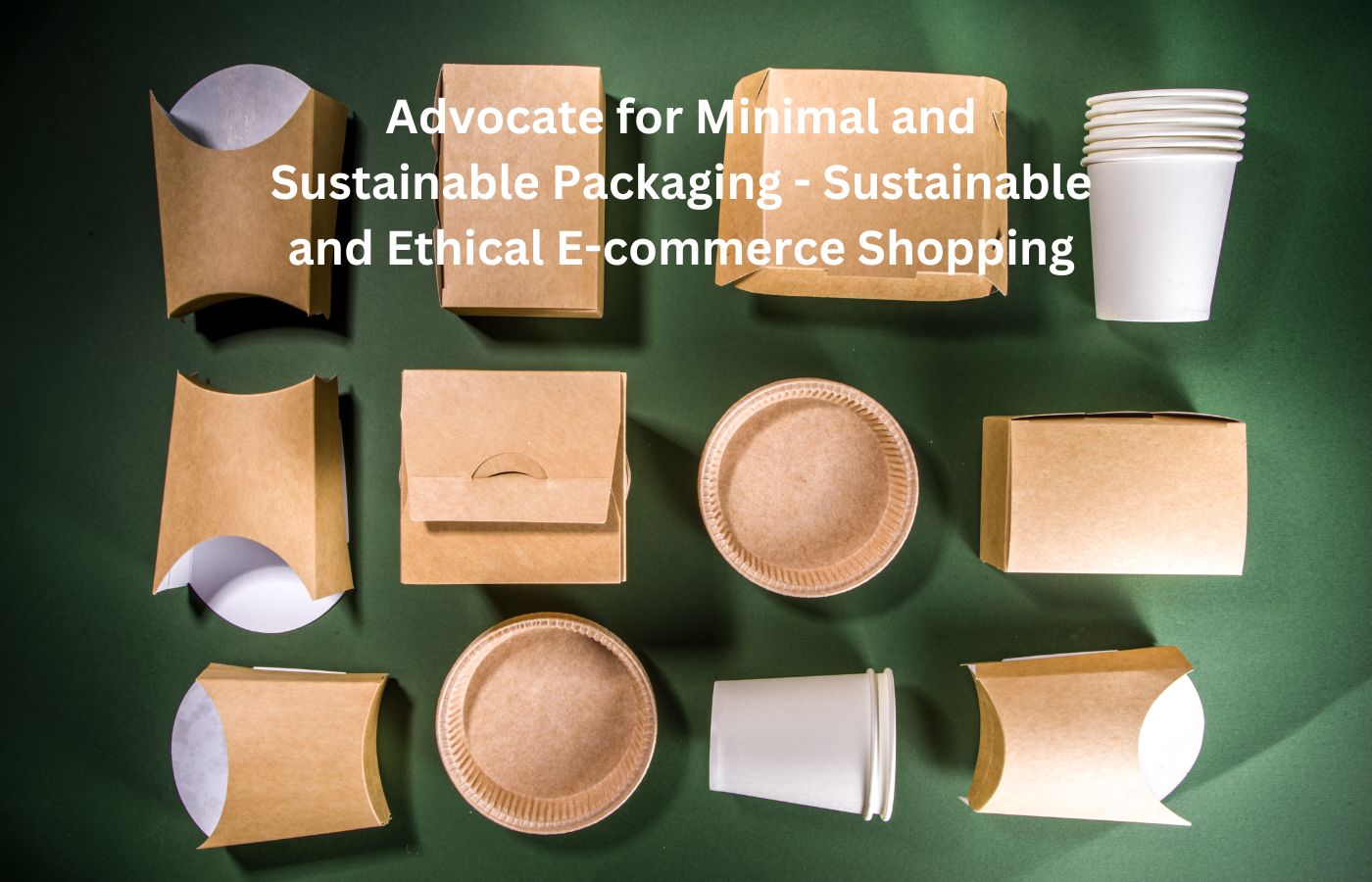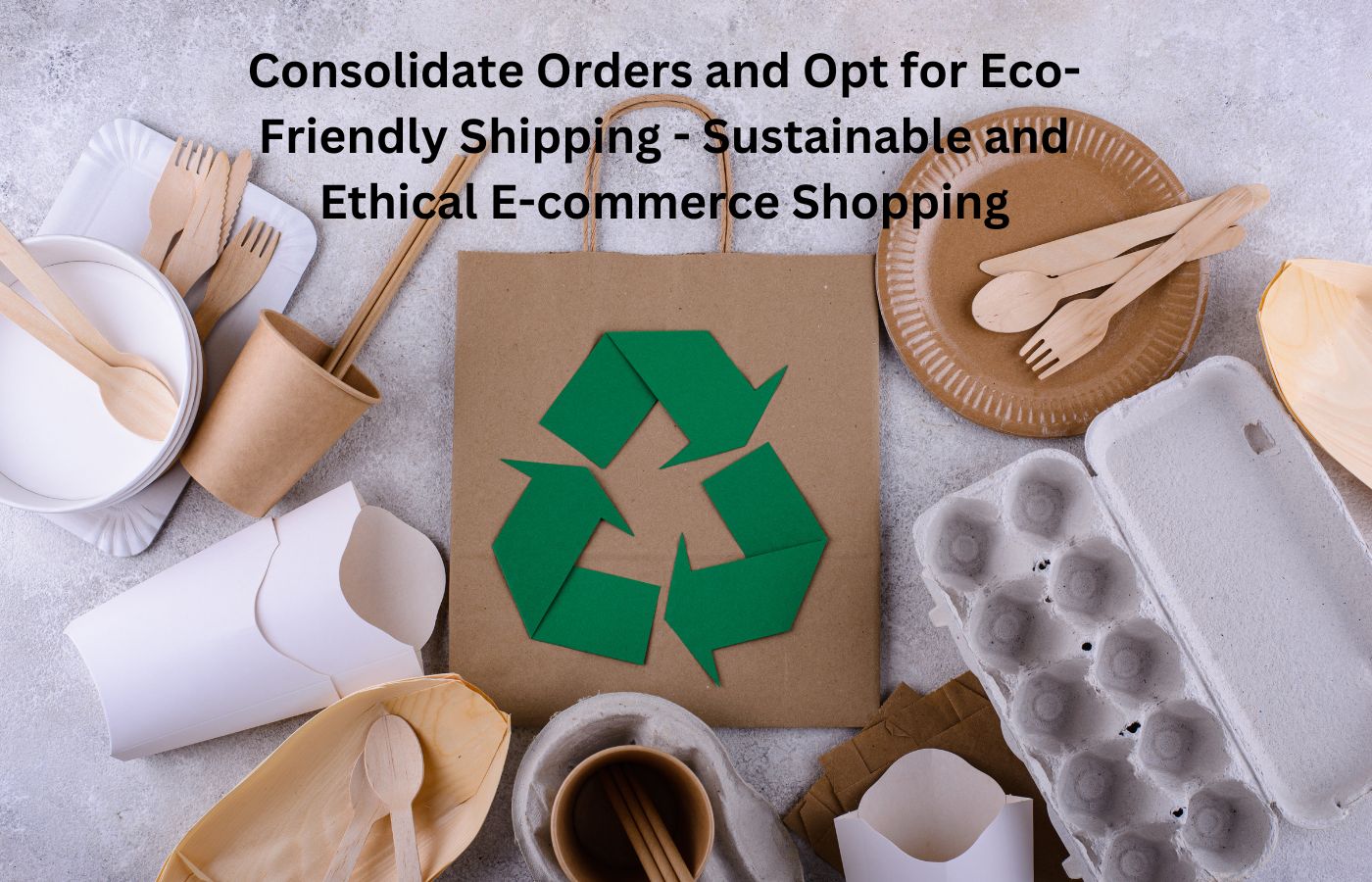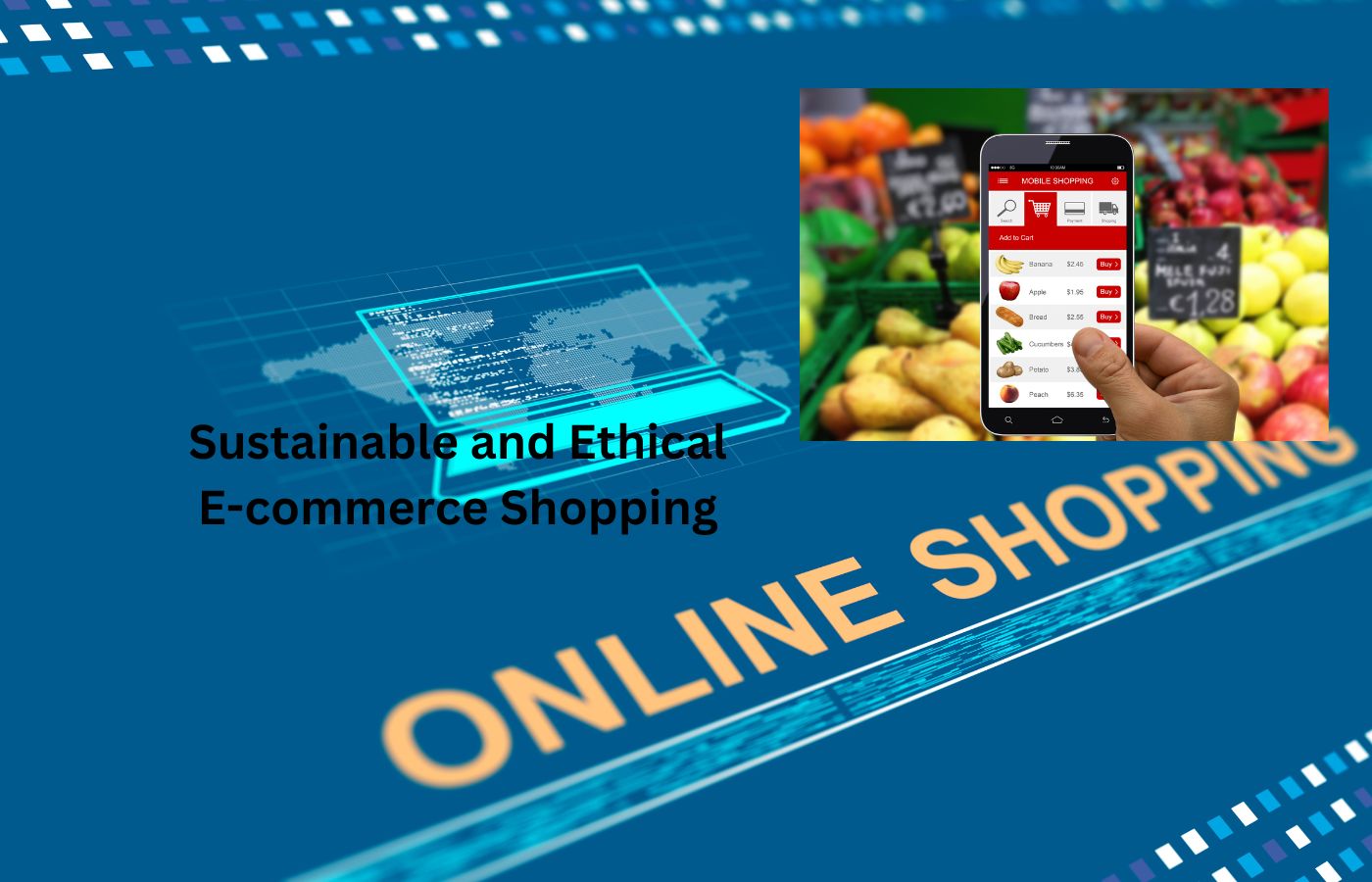Introduction – Sustainable and Ethical E-commerce Shopping
The evolution of e-commerce has been seen as one of the products that revolutionized shopping, in which customers can easily buy various goods with little to no hassle. Unfortunately, this convenience often leads to negative impacts on both the environment and society.
There are many issues related to e-commerce, but some include excessive packaging, carbon footprint from transportation, unscrupulous labor practices, and lack of visibility in supply chains. However, small actions can influence these aspects greatly; there is a significant shift among consumers toward sustainable and ethical e-commerce shopping is a trend that is sending shockwaves throughout the industry as more people realize that they can effect change through their purchase decisions.
This document is intended for those who want to become conscious online shoppers; it provides seven simple recommendations on going through sustainable and ethical e-commerce shopping choices. By adhering to these principles, you pledge your support toward a more equitable and sustainable future: every purchase makes an impact.
As consumers, we have the capacity — through our actions — not only to drive systemic change but also promote sustainability plus ethical practices within e-commerce; let us see how we can alter our habits when buying online such that it contributes towards saving both nature and humanity— all while benefiting ourselves too!
Empower Yourself Through Education

Knowledge is the cornerstone of your sustainable and ethical e-commerce shopping endeavors. Education gives you the power to make more informed buying decisions; moreover, understanding the environmental and social effects of purchases that slip under the radar in traditional retail experiences is paramount for sustainable and ethical e-commerce shopping.
Start by researching critical aspects of sustainable and ethical e-commerce shopping, such as carbon footprints, waste management, fair labor practices, supply chain transparency, and supply chain responsibility. Knowing where products come from allows you to accurately evaluate their sustainability and ethics practices across different brands and products.
Reliable sources for your research include reports from non-profit environmental and human rights organizations, academic studies in environmental science and social justice, and reputable media outlets covering these topics. Online platforms that promote sustainable and ethical e-commerce shopping are also valuable resources.
By staying informed about the latest trends and innovations in sustainable and ethical e-commerce shopping, you can align your shopping habits with your values. The knowledge you gain helps you make conscious choices and equips you to advocate for sustainable and ethical e-commerce shopping practices within the e-commerce industry. Ultimately, education empowers you to be a more responsible consumer, ensuring that online shopping contributes to a more sustainable and equitable future and sustainable and ethical e-commerce shopping.
Support Brands Committed to Sustainability and Ethics

Once you have acquired the necessary knowledge, the next step towards ethical e-commerce shopping should be actively supporting brands committed to sustainable and ethical e-commerce shopping.
At this juncture in corporate social responsibility, many brands are taking significant steps to minimize their environmental footprint and ensure fair labor practices. For easy reference, many have laid out policies regarding these topics on their websites or annual reports.
As you select brands to support, look for those that have demonstrated their commitment to sustainable and ethical e-commerce shopping through certifications or third-party verifications, such as B Corp, Fair Trade, or Rainforest Alliance certifications, indicating they have met social and environmental responsibility standards.
Further, many brands go beyond these standards by employing innovative practices that reduce their environmental footprint and promote social justice. Such methods include using recycled or sustainable materials, minimizing waste production, offsetting carbon emissions through carbon credit schemes, guaranteeing fair wages and working conditions, and encouraging inclusivity and diversity and sustainable and ethical e-commerce shopping.
Supporting these brands sends a solid signal to the e-commerce industry about what consumers value in terms of practices. Doing so encourages other companies to adopt similar practices and contributes to an overall trend toward sustainable and ethical e-commerce shopping. Each purchase you make casts your vote for the kind of world we all wish to live in.
Choose Eco-Friendly and Ethically-Sourced Products

It is critical to sustainable and ethical e-commerce shopping that you buy products that have been produced with consideration for both the environment and the people involved in their creation. These items must meet stringent environmental and humane production criteria to qualify as eco-friendly options.
When shopping online, please make an effort to select products made from sustainable materials like organic cotton, recycled plastics, bamboo, or hemp that have a lower environmental impact than their conventional counterparts, as these require fewer natural resources for production and may lead to less pollution.
Alongside materials, also consider how the products are constructed. Ethically sourced items respect the rights and welfare of people involved with the production; look out for products labeled Fair Trade that ensure producers in developing nations receive fair compensation for their goods while working under safe and decent conditions.
Avoid purchasing products produced using exploitative labor practices or in factories with subpar working conditions. Although this information might be more challenging, many ethical brands provide extensive supply chain transparency so you know your purchases support fair labor practices.
Shopping for eco-friendly and ethically sourced products is more than just an impulse buy; it expresses your values and vision of an ideal world. By prioritizing them, you are helping build a healthier planet and more equitable society while simultaneously signaling to businesses there is demand for sustainable products and sustainable and ethical e-commerce shopping.
Advocate for Minimal and Sustainable Packaging

One of the leading environmental challenges associated with online retail shopping is excessive packaging materials – from plastic wrappers and bubble wrap to cardboard boxes – contributing significantly to Waste and pollution. However, consumers can play an active role in advocating for minimal and environmentally sustainable packaging options.
When shopping online, select brands that prioritize sustainable packaging solutions – using recyclable or compostable materials whenever possible or offering innovative packaging designs that reduce material usage altogether.
Support these initiatives by selecting reduced, recyclable, or eco-friendly packaging products, such as recycled cardboard boxes, paper mailers, or biodegradable packing peanuts. In some brands, this option even exists to order without extra packaging and help to minimize waste production and sustainable and ethical e-commerce shopping.
Additionally, you can advocate for minimal and sustainable packaging by writing to companies to express your concerns about excessive packaging, praising brands that do an excellent job regarding sustainability, or sharing information regarding sustainable packaging practices on social media.
By advocating for sustainable packaging in online shopping, not only are you decreasing your environmental impact, but you are also encouraging companies to implement better practices. In doing so, you contribute to the broader movement towards sustainability and ethical shopping within e-commerce, ultimately creating a more eco-friendly future and sustainable and ethical shopping e-commerce shopping.
Consolidate Orders and Opt for Eco-Friendly Shipping

E-commerce’s shipping process is one of the main contributors to environmental degradation; carbon emissions generated during transportation account for most of this impact. However, as consumers, we can reduce this impact by consolidating orders and selecting eco-friendly delivery options when placing our orders.
Consolidating orders means buying multiple items simultaneously rather than placing separate orders over time. This practice decreases the delivery frequency, thus decreasing transportation emissions associated with your purchases and leading to less packaging waste, further minimizing waste reduction efforts.
Consider saving items in your cart and purchasing them simultaneously when shopping online. Many e-commerce platforms enable customers to create wish lists or save items, making it more straightforward for you to consolidate orders.
After consolidating orders, consider the available shipping options. Many online retailers now provide eco-friendly options like carbon-neutral shipping to offset emissions produced during transportation through initiatives like tree planting or investing in renewable energy projects.
Some companies also provide slower shipping options that are often more eco-friendly and reduce carbon emissions than express shipping options. Though you might experience slightly longer wait times for your purchase, doing this is worth making for our planet’s health.
By consolidating orders and choosing eco-friendly shipping, you can significantly decrease your environmental impact while supporting sustainable and ethical e-commerce shopping.
Support Local and Small Businesses

Supporting local and small businesses is an effective way to foster sustainable and ethical e-commerce shopping. Such companies tend to be better connected with their communities, more accountable for their practices, and more likely to prioritize sustainability and ethical sourcing practices than larger competitors.
Local businesses tend to have smaller carbon footprints as their products don’t travel long distances to reach customers, and they merely source materials locally – contributing positively to local economies while decreasing transportation-related environmental impact.
Small businesses enjoy greater control of their supply chains and can ensure fair labor practices. Because they likely know their suppliers personally, they can more easily verify the ethical sourcing of their products.
Supporting local and small businesses can have a profound effect on your community. Small- and medium-sized enterprises contribute directly to local economies through job creation and supporting events and initiatives in your neighborhood.
Support local and small businesses online shopping by selecting them instead of large corporations. Look for marketplaces dedicated to supporting these types of companies, or see if your local stores have online shops.
Remember, every purchase you make casts a vote for the kind of economy and world you envision for future generations. By supporting local and small businesses, you support sustainability, ethical practices, and community resilience in the face of global challenges.
Promote the Longevity of Products and Minimize Waste

E-commerce often encourages a “use and throw away” mentality; however, sustainable and ethical shopping requires practices promoting product longevity while reducing Waste. Promoting longevity plays a vital role in supporting responsible shopping practices.
Prioritize quality over quantity to achieve this objective. Purchasing high-quality items reduces Waste due to less frequent replacement needs; their higher initial cost often proves more cost-effective in the long run.
Consider the lifespan of the item when purchasing. Is it built to withstand wear and tear? Are repair services offered, or are spare parts that could prolong their usefulness? These are essential questions to answer when purchasing items.
Care for your possessions by performing regular maintenance. Doing this will significantly extend their lifespan, from clothing to electronics. Learning basic repair skills could allow you to remedy minor issues instead of purchasing replacements.
Lastly, when an item no longer suits your needs, consider selling, donating, rec, or cycling it instead of throwing it out. Many e-commerce platforms provide secondhand sections where used goods can be sold; many charities welcome donations of used items.
By investing in long-lasting products and minimizing Waste, you are not only lessening your environmental impact but also challenging the disposable culture of consumerist culture while pushing for more ethical e-commerce practices and sustainable business practices. Remember: every decision counts toward building a more sustainable future.
Sustainable and Ethical E-commerce Shopping

Sustainable and ethical online shopping is not simply trendy but necessary for achieving a more sustainable future. Adopting this approach offers tangible and intangible benefits that we should all embrace.
Respecting and conserving our environment is of primary importance when shopping green. By opting for eco-friendly and ethically sourced products, supporting minimal and sustainable packaging options, and consolidating orders with eco-friendly shipping, shoppers can significantly lower the impact of their shopping habits on our planet – including waste reduction, carbon emission reductions, and increasing renewable resource usage.
Second, ethical consumerism contributes to fair labor practices and economic justice. By choosing ethically sourced products and supporting local and small businesses, we ensure that those involved with production and distribution receive fair treatment and equal compensation.
Thirdly, it promotes product longevity and fosters an environment of responsibility and thoughtfulness. By purchasing high-quality, durable items and caring for what we own as much as possible to reduce Waste, we challenge disposable consumerism while helping us value what we already possess.
Sustainable and ethical e-commerce shopping provides personal satisfaction. Knowing that our shopping habits create a better world gives us purpose and fulfillment.
Sustainable and ethical e-commerce shopping provides immense benefits for our planet, society, and ourselves alike. It’s an easy yet powerful way to make a positive difference and something we all can participate in – be part of it and the change!
Conclusion: Sustainable and Ethical E-commerce Shopping
Sustainable and ethical shopping practices in e-commerce are more than mere trends; they represent essential steps toward building a more just world for future generations. Each of us, as consumers, plays an integral role in facilitating this change and sustainable and ethical shopping e-commerce shopping.
Whether advocating for minimal, eco-friendly packaging, consolidating orders to save on eco-friendly shipping, supporting local and small businesses, prolonging product lifespan, or minimizing Waste, every act contributes to more extraordinary sustainability efforts.
The benefits of eco-friendly practices extend far beyond environmental conservation, including economic justice, fair labor practices, and cultivating an environment of responsibility and thoughtfulness. Adopting such practices contributes positively to the planet and society and brings personal satisfaction and fulfillment.
Sustainable change must come from an institutional and individual perspective; our actions as consumers also matter. Collectively, they can change market dynamics to push companies toward more eco-friendly and ethical practices.
As online shopping becomes ever more commonplace, its importance as an ethical form of commerce cannot be overstated. Let’s use our power as consumers wisely by making choices that benefit ourselves and contribute to protecting the planet and future generations. Every small step toward sustainable and ethical e-commerce brings us closer to our collective goal.
What is sustainable e-commerce shopping?
Sustainable e-commerce shopping refers to the practice of making online purchases in a way that minimizes harm to the environment and society. This can involve various strategies, such as choosing products that are ethically made, opting for minimal and sustainable packaging, consolidating orders to reduce shipping emissions, and supporting businesses that prioritize sustainability and ethical practices.
How can I practice sustainable e-commerce shopping?
There are several ways to practice sustainable e-commerce shopping. You can choose to buy from businesses that prioritize ethical and sustainable practices, such as those that use sustainable packaging, offer carbon-neutral shipping, and ensure fair labor practices. You can also consolidate your orders to reduce shipping emissions and opt for slower, more eco-friendly shipping options. Additionally, buying high-quality, durable items can promote product longevity and minimize waste.
What are the benefits of sustainable e-commerce shopping?
Sustainable e-commerce shopping offers numerous benefits. It helps to conserve the environment by reducing waste and carbon emissions. It also supports fair labor practices and contributes to economic justice by supporting businesses that ensure fair wages and working conditions. Furthermore, it promotes a culture of responsibility and thoughtfulness, challenging the culture of disposable consumerism. Lastly, it can provide a sense of personal satisfaction, knowing that your shopping habits are contributing to a better world.
How can I support local and small businesses when shopping online?
Many local and small businesses have an online presence, and you can support them by choosing to buy from them over large corporations. There are also online marketplaces that specifically cater to local and small businesses. Supporting these businesses can have a significant impact on your community, as they often contribute more directly to the local economy by providing jobs and supporting local events and initiatives.
How can I promote the longevity of products and minimize waste when shopping online?
Promoting the longevity of products and minimizing waste can be achieved by prioritizing quality over quantity when making purchases. Buying high-quality, durable items reduces the need for frequent replacements, thereby minimizing waste. Regular maintenance can also extend the lifespan of products. When you no longer need an item, consider selling it, donating it, or recycling it, rather than simply throwing it away.
What are some ethical issues related to e-commerce?
Ethical issues related to e-commerce can include environmental impact, labor practices, and data privacy. Some online retailers have faced criticism for their environmental impact, such as excessive packaging and carbon emissions from shipping. Labor practices are also a concern, with some companies accused of exploiting workers. Data privacy is another significant issue, with concerns about how customer data is collected, used, and protected.
How can I ensure that the products I buy online are ethically made?
To ensure that the products you buy online are ethically made, you can look for certifications that indicate ethical and sustainable practices. However, it's important to ensure that these certifications are reliable and have strong standards, auditing, and certification procedures. You can also choose to buy from businesses that are transparent about their supply chains and labor practices, and that prioritize ethical and sustainable practices.
Digital Marketing Services, SEO and E-Commerce Solutions in Delhi, India
Author – Farhanul Haque
The article “7 Tips for Sustainable and Ethical E-commerce Shopping” is written by the Founder of Digitamizer who has been working in the e-commerce Sector Since 2006 and is also a certified Digital Marketing Professional from IIT, Delhi, India.

